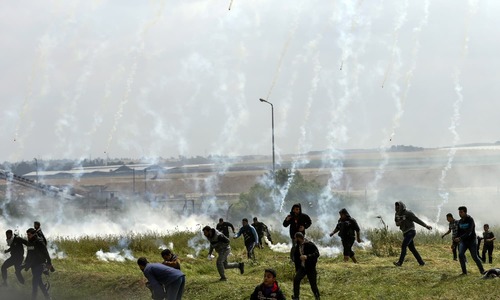Palestinians prepared for further protests near the Gaza border on Saturday, a day after a major demonstration led to clashes that saw Israeli forces kill 16 people in the bloodiest day since a 2014 war.
Protesters began returning to a tent city erected near the border with Israel to resume the demonstration planned to last six weeks in the blockaded enclave.
Thousands were attending funerals for those killed, with mourners holding Palestinian flags and some chanting "revenge".
A general strike was being held in both the Gaza Strip and the occupied West Bank.
Israel defended its soldiers' actions on Friday, when troops opened fire on Palestinians who strayed from the main tent city protest — attended by tens of thousands — and approached the heavily fortified fence cutting off the Gaza Strip.
The Israeli military says it opened fire only when necessary against those throwing stones and firebombs or rolling tyres at soldiers.
It also said there were attempts to damage the fence and infiltrate Israel, while alleging there was an attempted shooting attack against soldiers along the border that caused no casualties.
But Palestinians accused Israel of using disproportionate force, while human rights groups questioned Israel's use of live fire.
UN chief Antonio Guterres called for an "independent and transparent investigation".
In addition to the 16 killed, more than 1,400 were wounded, 758 of them by live fire, with the remainder hurt by rubber bullets and tear gas inhalation, according to the Gazan health ministry.
No casualties were reported among Israelis.
World 'must intervene'
Palestinian president Mahmud Abbas declared Saturday a day of national mourning and in a speech said he held Israel fully responsible for the deaths.
"The large number of martyrs and people wounded in peaceful popular demonstrations shows that the international community must intervene to provide protection to our Palestinian people," he said.
An Israeli military spokesman said that Friday's events were "not a protest demonstration" but "organised terrorist activity".
He accused Hamas, the Islamist movement that runs the Gaza Strip and which has fought three wars with Israel since 2008, of being behind it and threatened wider military action if it continued.
"If it continues, we shall have no choice but to respond inside the Gaza Strip against terrorist targets which we understand to be behind these events," Brigadier General Ronen Manelis told journalists.
The six-week protest is in support of Palestinian refugees and the timetable holds significance for a range of reasons that have added to tensions.
In pictures: Thousands gather for sit-in along Israel-Gaza border
It began on Land Day, when Palestinians commemorate the killing of six unarmed Arab protesters in Israel in 1976, and as Jewish Israelis readied to observe the Passover holiday, which started at sundown on Friday.
Protests will continue until the United States opens its new Jerusalem embassy around May 14, a move that has provoked deep anger among the Palestinians, who see the city's annexed eastern sector as the capital of their future state.
May 14 will also mark 70 years since the creation of Israel, while Palestinians will commemorate what they call the Nakba, or "catastrophe", the following day.
Nakba commemorates the more than 700,000 Palestinians who either fled or were expelled from their homes in the war surrounding Israel's creation in 1948.
'Lethal force'
US President Donald Trump has harshly criticised the Palestinians in the past, but the State Department said only that it was "deeply saddened" by the loss of life and urged steps to lower tensions.
Human Rights Watch criticised Israel's actions.
"Israeli allegations of violence by some protesters do not change the fact that using lethal force is banned by international law except to meet an imminent threat to life," the New York-based group said, calling the number of killed and wounded "shocking".
Israel's arch-foe Iran, a longstanding supporters of Hamas, condemned the "shameful" killing of protesters and mocked the fact that it happened as Israeli Jews prepared to mark Passover.
"On the eve of Passover [of all days], which commemorates God liberating Prophet Moses and his people from tyranny, Zionist tyrants murder peaceful Palestinian protesters — whose land they have stolen — as they march to escape their cruel and inhuman apartheid bondage," Foreign Minister Mohammad Javad Zarif tweeted.
Israel had deployed troop reinforcements along the border, including more than 100 special forces snipers, saying it would prevent attempts to break through the fence.
Protests along the border are common, often culminating in young Palestinian men throwing stones at Israeli soldiers who respond with tear gas along with rubber and live bullets.
But the "March of Return" protest that began on Friday is larger scale and is intended to involve families with women and children camping in tent cities near the border for weeks.













































